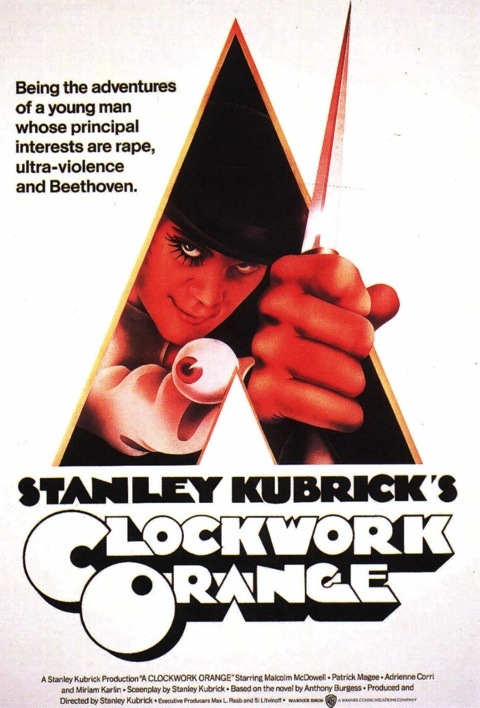A Clockwork Orange
Comprehensive Storyform
The following analysis reveals a comprehensive look at the Storyform for A Clockwork Orange. Unlike most of the analysis found here—which simply lists the unique individual story appreciations—this in-depth study details the actual encoding for each structural item. This also means it has been incorporated into the Dramatica Story Expert application itself as an easily referenced contextual example.
Story Dynamics
8 of the 12 essential questions
- Steadfast
- Main Character Resolve
Alex never willingly changes his roguish anti-social behavior, and when forced to do so, he prefers to die rather than give up that part of himself. Alex tries to hold out against the challenges to his self-authority: when his droogs begin to rebel, he teaches them a lesson; he skips school despite Mr. Deltoid’s efforts; he fights against the authorities during his interrogation; he tries to commit suicide rather than be forced to hate his individualism (represented by Beethoven’s 9th Symphony).
- Stop
- Main Character Growth
Alex is caught up in circumstances beyond his control as he becomes a pawn of political machinations—he tries to hold out until it stops. Alex’s nature is trapped in a society not of his own making—society attempts to make his behavior conform by forcing him to go to school, imprisoning him, and brainwashing him. Alex is trying to keep his nature intact while outlasting these threats. From society’s viewpoint, it is waiting for Alex to stop committing random acts of senseless violence.
- Do-er
- Main Character Approach
Alex acts impulsively doing whatever he wishes. On whims, Alex beats the tramp, attacks Billy Boy’s gang, steals a car and runs others off the road, rapes Mr. Alexander’s wife, has serendipitous sex with two teenagers. He does not deliberate over these actions as is apparent when the consequences he has not even considered catch up with him.
- Male
- Main Character Mental Sex
Alex evaluates matters primarily by cause and effect. When Alex wants something, he simply goes out and gets it. If he needs money, he steals it; if he wants to let out aggression, he beats people up; if he wants sex, he rapes; if his droogs do not listen to him, he teaches them a lesson; wanting to leave prison, he sees the Ludovico treatment as the way out, not as the process it places him in.
- Action
- Story Driver
Actions put the characters in their respective positions in the story. Alex’s avoidance of school, beating of the tramp, attack on Billy Boy’s gang, rape of Mr. Alexander’s wife, and murder of the Cat Lady are what move the story toward his having to face the repercussions of these actions in the form of Mr. Deltoid, tramps attacking him, the authorities, prison, and Mr. Alexander’s attempt at revenge.
- Optionlock
- Story Limit
Alex has only a finite number of ways to overcome the effects of society’s pressure on him. First he tries to live without regard to societal rules, then turns to the Ludovico treatment to escape punishment from the State, then to his parents for shelter, inadvertently to Mr. Alexander, and finally to the Minister of the Interior, Fred.
- Success
- Story Outcome
Alex achieves his goal of regaining his freedom and self-identity. Ultimately, Alex’s steadfastness pays off as society changes in the form of the politicians adapting to his needs, curing him of the Ludovico treatment and putting away Mr. Alexander, while his parents also try to reconcile with him.
- Good
- Story Judgment
Alex resolves his personal problems—his conflict with society—by making society accept him. As frightening as it may be to unleash Alex back into society, it is worse to eradicate individuality. To have a society worthwhile to live in, society must compromise with the needs and desires of the individual. Also, in this particular society, Alex’s evil is matched, if not surpassed, by society’s own corruption.
Overall Story Throughline
"A Bit of the Old Ultra-Violence"
- Universe
- Overall Story Throughline
The objective characters are caught up in untenable situations: uncontrolled lawless youths terrorize society; Alex is imprisoned for murder and brainwashed through the complex machinations of those around him—his fellow droogs, a crazed writer, and a crafty politician; Alex’s bedroom and the affection of his parents has been usurped by a fawning lodger; etc.
- Progress
- Overall Story Concern
Alex is concerned with how his freedom of action is progressively being hindered. Mr. Alexander is concerned with the progress of political change in society and later, vengeance against Alex. Minister of the Interior, Fred, wants his status and political power to advance. Alex’s droogs want to move on without him. Deltoid wants to make progress in convincing Alex to go to school.
- Fantasy
- Overall Story Issue
All the characters are engaged in their own fantasy worlds with no connections to the realities of their interrelationships. Alex’s fantasy is believing he will never have to pay for his actions. Mr. Alexander’s radical political agenda does not fit with reality, as Alex is both proof of his theories of government totalitarianism and an intrusive reality of basic drives that he himself cannot tolerate. Fred does not connect with reality at all and only does that which will get him re-elected. The prison governor’s attempt to impose extreme order is unrealistic. The prison chaplain also lives in fantasy, being unable to see through Alex, believing him to have a “genuine desire to reform.”
- Fact
- Overall Story Counterpoint
- Overall Story Thematic Conflict
Fantasy vs.Fact - Test
- Overall Story Problem
Alex tests to see how much he can get away with both with society at large and his own society of droogs. The State, through Dr. Brodsky, uses Alex as a test to see if his free will can be removed. The psychiatrists test to see if Alex has overcome the effects of the Ludovico treatment.
- Trust
- Overall Story Solution
Fred and society are finally compelled—by its own internal forces of politics, media, and public outcry—to trust Alex without knowing what he will be like in the future.
- Unending
- Overall Story Symptom
Society finds the antics of Alex—the beating, stealing, and raping—and the actions of those like him to be un-ending. This motivates society to respond with experiments like the Ludovico treatment. Alex’s parents see their son as a perpetual bad boy.
- Ending
- Overall Story Response
The State tries to end the criminal element through forced behavior modification. Mr. Alexander tries to end State injustice and also tries to end Alex’s life. Alex’s droogs try to end Alex’s domination over them. Alex’s parents try to end his role in their lives.
- Fact
- Overall Story Catalyst
- Skill
- Overall Story Inhibitor
- Future
- Overall Story Benchmark
By establishing what will happen in the future will everyone feel the problem has been resolved. The State brainwashes Alex to prevent him from being vicious in the future. Mr. Alexander uses Alex as evidence of the State’s monstrosities to call for future radical reform. Fred makes a deal with Alex as insurance for his future in politics. The droogs set up Alex’s capture by the police to forego his future meddling in their lives. Deltoid pressures Alex to be careful to prevent future misbehavior.
Additional Overall Story Information →
Main Character Throughline
Alex — Droog Leader
- Physics
- Main Character Throughline
Alex constantly engages in unwholesome activities: he beats a wino, attacks Billy Boy’s gang, steals cars and money, rapes Mr. Alexander’s wife, hurts Georgie and Dim.
- Doing
- Main Character Concern
Alex wants to be able to do whatever he wants. The State takes the freedom to act away from him and he is concerned with getting it back.
- Enlightenment
- Main Character Issue
Alex sees himself as more enlightened than others because he can get whatever he desires, whenever he desires, unlike others who confine themselves to the rules of society.
- Wisdom
- Main Character Counterpoint
- Main Character Thematic Conflict
Enlightenment vs.Wisdom - Process
- Main Character Problem
Alex is caught up in a process of committing acts society deems atrocious which leads to effecting his imprisonment, and later the Ludovico treatment.
- Result
- Main Character Solution
Alex resolves his problem through the results of the process he goes through—vicious youth, prisoner, experimental test subject, exploited victim, and finally to becoming a free man catered to by those in power. Each step brings him to the next until finally the results of the Ludovico treatment creates a public backlash forcing the State to cure Alex.
- Unending
- Main Character Symptom
Alex finds society’s pressure on him to change through school, laws, etc., un-ending.
- Ending
- Main Character Response
Alex tries to end his droogs’ insurrection, the torments of the Ludovico treatment, and ultimately his own life.
- Wisdom
- Main Character Unique Ability
- Security
- Main Character Critical Flaw
When Alex tries to secure his interests, it slows his progress: attacking Dim when he interrupts Beethoven’s 9th leads to the droogs attacking him, volunteering for the Ludovico treatment makes him suffer more than prison would have.
- Obtaining
- Main Character Benchmark
Alex measures his progress through what he can possess or achieve. Alex is happy when he is able to rape, maim, and steal. After obtaining the droogs’ humiliation, he believes they have learned their lesson. Alex is most concerned when he is unable to achieve, that is, when he is under the effects of the Ludovico treatment, which keep him from hurting those who would hurt him. His problem is resolved at the end when he can once again obtain his sexual fantasies.
Additional Main Character Information →
Influence Character Throughline
Society — Final Authority
- Psychology
- Influence Character Throughline
Society pressures people to adopt certain conservative ways of thinking and to oppose those like Alex who are nonconformists.
- Being
- Influence Character Concern
Society is concerned with its citizens adopting a conformist lifestyle independent of the individual’s desires. Society brings this about through its institutions that enforce discipline—the school, the police, the prison, the hospital.
- Thought
- Influence Character Issue
Society, represented by Mr. Alexander at one end of the political spectrum, and Minister of the Interior, Fred, at the other end, undergoes a process of consideration examining their approach to handling society (and the problem posed by Alex in particular) from different perspectives.
- Knowledge
- Influence Character Counterpoint
- Influence Character Thematic Conflict
Thought vs.Knowledge - Test
- Influence Character Problem
Society tests Alex through the Ludovico treatment.
- Trust
- Influence Character Solution
Ultimately, society must trust Alex’s behavior as other options such as prison and the brainwashing fail.
- Determination
- Influence Character Symptom
Society believes its problem lies in determining what to do about criminals like Alex, whether to imprison them, to brainwash them, or allow them freedom.
- Expectation
- Influence Character Response
Society attempts to solve the problem by creating an expectation of criminal behavior after the Ludovico treatment. Criminals undergoing the treatment are expected to be cured of their aggressive tendencies.
- Knowledge
- Influence Character Unique Ability
Society utilizes knowledge to confound Alex; scientific knowledge enables society to put Alex through the Ludovico treatment.
- Confidence
- Influence Character Critical Flaw
Society believes and expects its problems to be solved by utilizing its knowledge via school, laws, scientific experimentation, but overestimates its results and instead creates a hapless creature like Alex which effects public sentiment and a backlash undermining its efforts. Fred’s confidence in the Ludovico treatment’s effectiveness prevents him from seeing its social ramifications.
- Becoming
- Influence Character Benchmark
Society evaluates its progress by the transformation of its nature: less crime, more control, political gains.
More Influence Character Information →
Relationship Story Throughline
"Society's Child"
- Mind
- Relationship Story Throughline
Alex and society diverge in their fixed attitudes about worth, control, and freedom. Alex finds his antics to be normal, everyday behavior but his actions shock the collective mind of society. On the other hand, Alex finds society brutal for removing his individuality and freedom.
- Preconscious
- Relationship Story Concern
Alex wants to follow through with his immediate responses by doing whatever he wishes (beating, stealing, raping), while society wants to control these immediate responses through the conditioning of school, prison, and the Ludovico treatment.
- Worth
- Relationship Story Issue
Alex and society see everything in terms of usefulness to oneself/itself without any concern for the consequences. Alex prizes the worth of beating and raping which conflicts with society’s placing worth on order and control without regard to what Alex desires.
- Value
- Relationship Story Counterpoint
- Relationship Story Thematic Conflict
Worth vs.Value - Determination
- Relationship Story Problem
Society determines the cause of its ills as Alex’s drive toward violence. Alex determines the problem lies in society’s pressure for him to conform.
- Expectation
- Relationship Story Solution
The solution lies in either Alex or society conforming to the expectations of the other. In the end, society must cater to Alex’s expectations as segments of society refuse to tolerate the removal of basic drives from the individual.
- Unending
- Relationship Story Symptom
Society believes the problem between itself and Alex is that his robberies, beatings, and rapings are un-ending, while Alex finds society’s hampering of his activities to be un-ending.
- Ending
- Relationship Story Response
Both Alex and society move toward trying to end each of the other’s interference. Society apprehends Alex and punishes him to end his criminal activity. Alex tries to end his prison sentence by volunteering for the Ludovico treatment.
- Value
- Relationship Story Catalyst
The story progresses when Alex and society find something of objective value to them both. For example, Alex values the Ludovico treatment as a means of escaping prison while society values it as a means of ridding the criminal element.
- Ability
- Relationship Story Inhibitor
- Subconscious
- Relationship Story Benchmark
The state of Alex’s basic drives indicate the degree to which the problem between Alex and society has developed. As Alex is forced to lick a man’s shoe on the stage and unable to touch the naked woman, his subconscious state indicates society’s progress, but as Alex obtains his sexual fantasy in the end, Alex’s original subconscious has been reinstated indicating his victory.
Additional Relationship Story Information →
Additional Story Points
Key Structural Appreciations
- Progress
- Overall Story Goal
Everyone is concerned with Alex’s developing psychopathic tendencies, and any progress that is made in his treatment.
- Preconscious
- Overall Story Consequence
If Alex is allowed to continue acting on his impulses, more members of society will be harmed. If, after the Ludovico treatment, Alex still has violent instincts, he will make himself ill.
- Being
- Overall Story Cost
Costs incurred on the way to the goal are fulfilling roles contrary to one’s true nature. During the course of the story, Alex is forced to adopt a temporary lifestyle as everything he used to love becomes an aversion to him after the Ludovico treatment. Fred adopts the manner of being which suits him best for getting re-elected, first supporting the Ludovico treatment, then opposing it.
- Doing
- Overall Story Dividend
The characters accrue benefits from their physical activities. Alex pleases himself by robbing, beating, and raping—as do his droogs. Mr. Alexander tortures Alex with Beethoven’s 9th to avenge his wife’s rape and death. The droogs and the tramp beat Alex for their own vengeance. Deltoid and the police derive pleasure in finally capturing Alex red-handed.
- Future
- Overall Story Requirements
Obtaining the goal of either securing society from those like Alex or retaining freedom for the individual rests in establishing a future state dependent on whether the Ludovico treatment, which forces its subjects to behave in a restricted manner, will be accepted.
- Subconscious
- Overall Story Prerequisites
The acceptance or rejection of the Ludovico treatment is pending on its effectiveness of altering the subject’s basic drives. The Ludovico treatment works and alters Alex basic drives for self-expression through violence.
- Becoming
- Overall Story Preconditions
The State imposes the condition that the Ludovico treatment must transform the nature of the criminal into an impotent form for it to be a success. Ironically, it is the treatment’s success that causes it to be rejected as the public finds Alex’s transformation repulsive.
- Obtaining
- Overall Story Forewarnings
As the State obtains the success of the Ludovico treatment, Alex’s progress in freeing himself from society’s constraints diminishes, and his preconscious behavior is removed from his control. Mr. Alexander keeping Alex in his house puts Alex’s life at risk.
Plot Progression
Dynamic Act Appreciations
Overall Story
- Past
- Overall Story Signpost 1
- Progress
- Overall Story Signpost 2
- Future
- Overall Story Signpost 3
- Present
- Overall Story Signpost 4
Main Character
- Learning
- Main Character Signpost 1
- Doing
- Main Character Signpost 2
- Understanding
- Main Character Signpost 3
- Obtaining
- Main Character Signpost 4
Influence Character
- Conceiving
- Influence Character Signpost 1
- Conceptualizing
- Influence Character Signpost 2
- Being
- Influence Character Signpost 3
- Becoming
- Influence Character Signpost 4
Relationship Story
- Preconscious
- Relationship Story Signpost 1
- Conscious
- Relationship Story Signpost 2
- Memory
- Relationship Story Signpost 3
- Subconscious
- Relationship Story Signpost 4
Plot Progression Visualizations
Dynamic Act Schematics
OS:  MC:
MC:  IC:
IC:  RS:
RS: 




